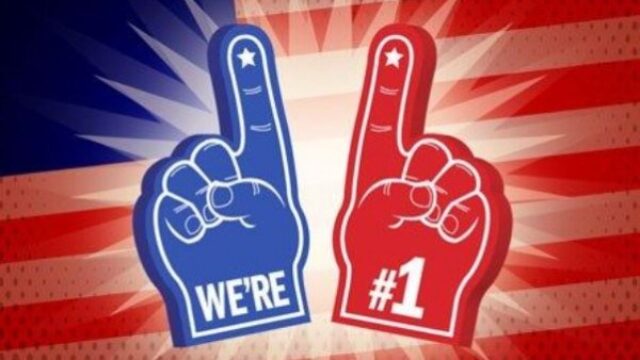Dependence Day

We are encouraged to celebrate the 4th of July – which is rarely referred to anymore as Independence Day – probably because Americans have become such a dependent people. They do not, of course, like to think of themselves that way.
But aren’t they?
Benjamin Franklin, who was a key player in the struggle for independence from Great Britain, was an independent man by the time he was about 40. So also John Adams, who – along with Franklin and Jefferson – negotiated the alliance with France that secured American independence from Great Britain. Franklin and Adams and other men of that time could and did achieve independence for themselves via “industry,” or hard work and prudent action. Franklin began as an assistant in a printer’s shop and became the most successful publisher in the colonies, which made him a wealthy and independent man by early middle age. He was thus able to spend the rest of his long life pursuing his many interests. He did not have to worry about having to work because he had plenty of money to pay for his needs for the remainder of his life.
He had this money because the government didn’t take it.

School kids are told all about “taxation without representation” – as if “representation” made “taxation” legitimate; the fallacy here is that the “representative” is your agent who acts according to your instructions when in fact he is a man who acts as he likes and claims his actions “represent” what he styles “the people.” And most people fall for this. They are rarely told how little in taxes the colonists – under the British – were forced to pay. There was no tax on income, for one. What you earned via your industry was entirely yours. As opposed to maybe 80 percent yours, after federal taxes. Then a bit less than that after state taxes. And less, again, after all the other taxes – leaving you in the end with perhaps 65 percent of what you earned. Which means having to earn back the loss in order to break even.
The colonists didn’t have to pay rent to the government to avoid being kicked out of their homes, either. Thus, a man who was industrious in his teens and twenties and successful by his 30s could aspire to become a free man by his 40s, in the sense that he was free of debt and – much more important – free of “owes.”
Therein lies an independence unimaginable to Americans today because no American has enjoyed it for at least the past 112 years.
You have to go back at least that far to get to a time when what an American earned via his industry was entirely his, both in fact and law. If you earned a dollar, you had a dollar – not 70 cents. And if you didn’t contract a debt – freely – you owed no one anything. If you saved, you had. Imagine it. Or try to.
Americans of the pre “owes” era had the comfort of knowing that work paid – as opposed to having to pay because they worked. That what they earned did not establish an “owes.
Today’s Americans live with endless “owes.” The notices come in the mail regularly, even though they contracted no debt. They must live with uneasy knowing that the government can – and probably will – demand even more money than it already says they “owe” because it has already assumed the power to claim they “owe” some of it. This is why elections are so hotly contested. They are, as Mencken observed, a kind of advance auction of stolen goods. If your next-door neighbor can vote to have your stuff taken by the government – to make you hand over money to pay for what he wants – then you are not an independent man.
None of us are, save perhaps the extremely wealthy. They can live de facto independently even if the government takes 80 percent of everything because the remaining 20 percent is still vastly more than the rest of us will ever possess. But this is oligarchy and even the oligarchs are not independent in the way that Franklin was. The oligarchs wealth could be entirely taken, too – whereas Franklins wealth was secure, protected both by law and the moral customs of his time.
Our time is a very different one.
It is a time of near-ubiquitous grift, in which everyone is trying to protect themselves from everyone else because it seems everyone else is an electoral enemy eager to vote to have the government take their money or otherwise diminish them. There is no possibility of being independent – free of all of that – in what has become of the United States.
You will never own your home, because you will always have to pay to avoid being removed from it.
This business of taxing property renders everyone who pays rent a dependent – upon the income needed to pay it. Other taxes must be paid, on top of that. Nothing can be bought without paying more taxes – using the remainder of one’s money after it has already been taxed multiple times. Most workers don’t even get to briefly possess a portion of their earnings, which are “withheld” by the government.
It is very difficult to be independent when you must work – and have to pay. This is why most Americans work until they are too old to work any longer – at which point they are dependent upon their caretakers and whoever pays for that. The great bulk of Americans spend their “golden years” worrying about whether they’ll have enough money – precisely because the government took so much of it during their working lives.
The best most of us can hope for is that our industry is sufficient to pay the government and leave us enough to pay our expenses as we go. But that is not independence. The kind that was once available to any American willing to work for it. Because other Americans decided they didn’t want to work for it – and voted for the government to make everyone a dependent.



